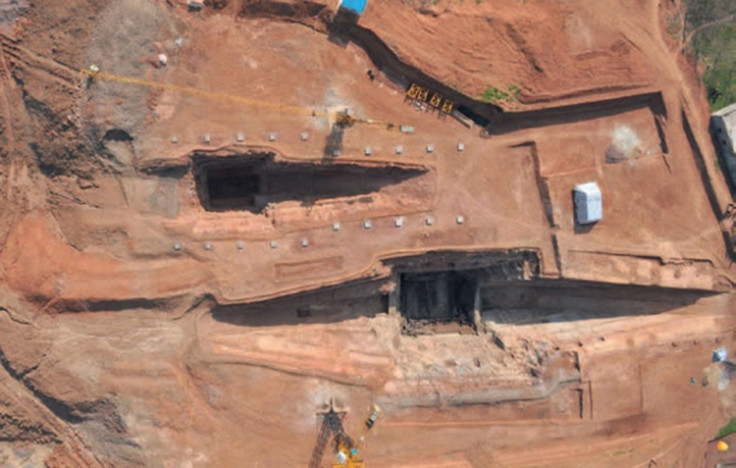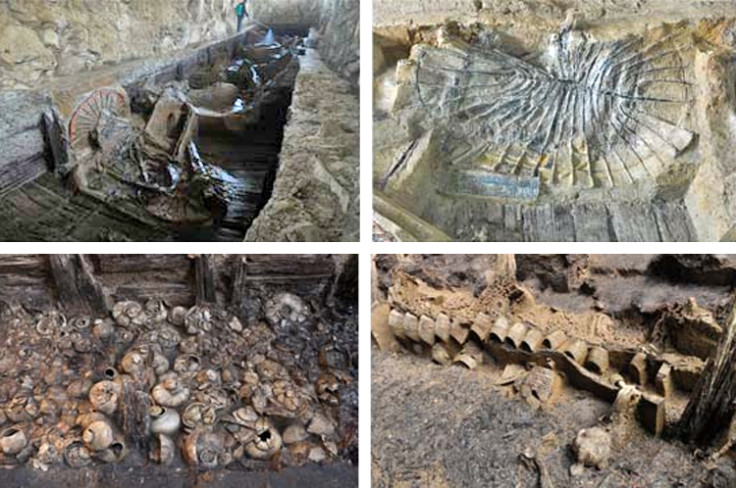Chinese King's 2,100-Year-Old Treasure-Filled Tomb Discovered

Archaeologists from Nanjing University have discovered the 2,100-year-old tomb of a Chinese Han dynasty king, complete with thousands of artefacts and more than 10,000 pieces of treasure.
The tomb of Liu Fei was found at the top of the Dayunshan mountain in Xuyi County, Jiangsu province in 2011, and the archaeologists have spent more than two years excavating the mausoleum complex, which includes three main tombs, the burial areas of 11 attendants, two weaponry pits, a treasury, a kitchen and two horse and chariot pits bearing the remains of horses.
Although the complex had already been looted several times before in antiquity as it is in the vicinity of Han dynasty tombs to the south-west, the archaeologists found treasures made from gold, silver, bronze, jade and lacquer, as well as several life-sized chariots and dozens of miniature chariots.
The tomb marks the first-ever discovery in China of bronze elephant and rhinoceros sculptures, which historians say proves that trade existed between ancient China and foreign countries.
Liu Fei was prepared for the afterlife with both a kitchen and a treasury. Archaeologists found a section of the burial chamber containing bronze cauldrons, wine vessels, cups, pitchers, as well as animal bones, fruit seeds and seashells.
In another section of the chamber, more than 100,000 ancient banliang coins (coins that contain a square hole in the centre) were discovered.
Burial chambers

The king's tomb chamber originally consisted of a coffin, an outer coffin as well as lacquered bamboo boxes, according to the translated report published in Chinese Archaeology.
Sadly, the main burial chamber was looted, the coffins damaged and the body of the king is gone.
"Near the coffins many jade pieces and fragments, originally parts of the jade burial suit, were discovered. These pieces also indicate that the inner coffin, originally lacquered and inlaid with jade plaques, was exquisitely manufactured," the archaeologists write in the report.
In a tomb adjacent to the king's, the archaeologists discovered a jade coffin, the very first of its kind to have been found intact in Chinese history.
Although the archaeologists do not know to whom this tomb belongs, they think that the person was someone of high status as they discovered 200 sets of jade, gold, silver and bronze objects.
The 11 attendants are believed to have been buried in their tombs when they died naturally, and the tombs contain rich burial goods, including golden belt hooks in the shape of a rabbit and a wild goose.
Who was Liu Fei?

Liu Fei was a feudal king who lived from 221 BC to 189 BC, just after the first emperor Qin Shi Huang united China.
After Qin Shi Huang died, the Qin empire fell and Liu Fei's father Liu Bang, a member of the peasant class, founded the Han dynasty and became emperor Gaozu.
Liu Fei was the eldest son of Gaozu but he was illegitimate, born to the concubine Consort Cao. As he could not become his successor, Gao made Liu Fei the prince Daohui of Qi and gave him control of seven cities from the former Qin empire.
After emperor Gaozu's death, Liu Fei continued to be close to his younger brother Liu Ying (later emperor Hui), who became the second emperor of the Han dynasty, but his wife empress dowager Lü wanted him dead.
Liu Fei gave her one of the cities he was in control of in order to save his life, and later Lü's son, emperor Houshao, a puppet ruler, began annexing parts of Liu Fei's kingdom.
Liu Fei ended up spending most of his life forming alliances with other states that did not agree with the Han dynasty rule, and manoeuvring politically to take back all annexed states and keep his kingdom.
Eventually after Liu Fei's death, his son Liu Jian plotted against the emperor and the Qi kingdom was seized.
Much ancient gossip survives about Liu Jian, including the fact that he was incestuous with his older sister, and that he engaged in an orgy with 10 women in a tent above his father Liu Fei's tomb.
© Copyright IBTimes 2025. All rights reserved.





















